By Erica Wright and Ameera Steward
The Birmingham Times
(First of two parts)
One year ago this month, the world changed. March 2021 observes an anniversary that changed—and cost—lives around the globe. The COVID-19 pandemic turned our way of life upside down and will leave an indelible mark on history.
Over the past 12 months, hospitals ran out of beds, schools closed, businesses shut, grocery stores ran out of cleaning supplies, like Lysol and Clorox, and products like toilet paper and paper towels. Mandates like “remain six feet apart to practice social distancing” and “wear a face mask or covering” have become a part of the lexicon. Municipalities and the businesses in them have been transformed, and the Birmingham metro area is no different.
The Birmingham Times spoke with officials from more than a dozen area organizations and entities to discuss the changes they’ve implemented in the year since the onset of the COVID-19 pandemic.
A.G. Gaston Boys and Girls Club (AGGBGC)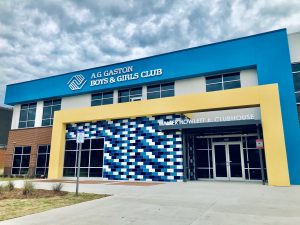
Catering to mostly young people over the past year meant extra precautions from a health, safety, and academic perspective, said Frank E. Adams, CEO of the A.G. Gaston Boys and Girls Club (AGGBGC). The facility closed its doors in March 2020 but reopened in July and has been in continuous operation since.
To ensure everyone’s safety, the club has a full-time nurse onsite, which it didn’t have pre-pandemic, to “make sure our young people, as well as our staff, are adhering to our guidelines,” Adams said.
In addition to requiring masks, washing of hands, and social distancing, the AGGBGC limits facility access to those who are not part of the staff. Virtual engagement has also become a key component.
“We had members of our team who would log on and virtually connect with our members to keep them engaged,” Adams said. “Being able to offer young people a safe, nurturing environment to continue their learning with support from caring adults has been very helpful.”
One casualty of the pandemic has been field trips.
“We are not able to do that, … but we’re able to take virtual trips so our young people are still able to go beyond the confines of their communities and still see the broader world,” Adams said.
While students still get what they need remotely, most of their mentors work in person since operations resumed. AGGBGC employees have been provided with personal protective equipment (PPE) and temperatures are checked at the door.
Despite it all, “We will continue to be a place where kids run to as opposed to run away from,” said Adams. “That’s important for us—and it’s in the spirt of Dr. Gaston’s legacy that we operate.”
Alabama Power
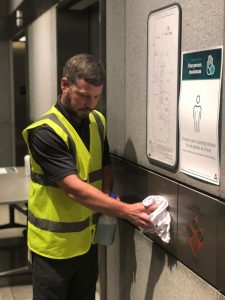
As an essential business, Alabama Power employees never stopped working, but adjustments were made when the pandemic brought the city to a near standstill, said Anthony Cook, a spokesperson for the company.
“We adjusted operations by shifting to staggered work schedules at critical facilities and focused on essential work to sustain operations and maintain business continuity, while protecting the safety and health of our employees,” said Cook. “For six months, we limited walk-in services at our local business offices across the state to ensure the safety of our employees and our customers.”
The utility continues to take proactive measures to prevent the spread of the virus, “including providing additional PPE; encouraging social distancing and aggressive sanitization practices; and limiting business travel,” Cook said.
Because Alabama Power is an essential business, “nearly two-thirds of our workforce is on-site, while other employees continue to work remotely,” he continued. “We’re committed to protecting the health and safety of our employees and the public as we work to deliver the reliable energy needed to power our state.”
There are important lessons in running a huge company through a pandemic, including “learning the value of a having flexible and adaptable workforce,” Cook said. “Learning from this crisis will help us develop the workplace of the future.”
Birmingham Civil Rights Institute (BCRI)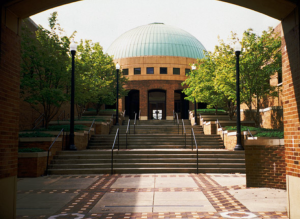
After closing its doors in mid-March 2020, leaders at the Birmingham Civil Rights Institute (BCRI) had to come up with a way for visitors to experience the Institute from the outside, said Board of Directors Chairman Isaac Cooper. As a result, virtual programs and conversations increased with the help of partners, including BBVA Compass, Apple Inc., and Ed Farm, which provided support that allowed the Institute to add several virtual offerings, such as digital learning that allows the story of Birmingham to be shared across the globe, Cooper said.
Still, the BCRI faced challenges different than what others had to encounter. For example, artifacts had to be considered when sanitizing the building.
“We have very precious art in the building, and there are different types of paint and texture on [the art], so we probably can’t use [some chemicals] to sanitize,” Cooper explained. “We have to ensure that we preserve the value of the Institute as it pertains to our products, our galleries, and our exhibits but at the same time adhere to [Centers for Disease Control and Prevention (CDC)] guidelines.”
The changes implemented were made with more than visitors in mind; some BCRI employees work both remotely and in person.
“We had to put together protocols and procedures to make sure the overall environment was safe,” Cooper said, citing, for example, that the Institute now has a paperless process for getting tickets, which are sold for specific time slots to ensure that there’s a spaced amount of time between each visitor.
Prior to the pandemic, BCRI team meetings were usually in person, so switching to videoconferences via the Zoom online platform has changed the way the staff interacts—and it’s been a good thing, said Cooper.
“We’ve gotten closer,” he said. “I think it’s been a really good moment for the team to establish, … with all these changes, ‘What is the new rhythm?’ Also, ‘How do we still uphold the mission in the midst of these changes?’”
The biggest impact has been on those who volunteer at the BCRI because they can be the most vulnerable in the community—Black and brown individuals in their 50s, 60s, and 70s, he said. Those individuals have to be extra cautious.
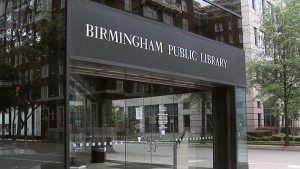 Birmingham Public Library (BPL)
Birmingham Public Library (BPL)
In March 2020, the Birmingham Public Library (BPL) temporarily closed. In June, it started offering curbside service, where patrons could pick up physical materials; that service is still being offered. In October, the downtown Central Library reopened. In January 2021, all 18 branches followed, though several changes have been implemented.
“We have installed [Plexiglas] shields, so patrons and staff members can socially distance when conducting business,” said Janine Langston, BPL Interim Director, who also pointed out that all staff are required to wear face coverings.
“We have hand sanitizing stations throughout all of our facilities and have masks available for patrons who may visit without masks,” she added. “[Also], …in conjunction with all of the libraries in Jefferson County, all returned materials go through a quarantine period.”
Most of the BPL’s programs also went online, Langston said, including Wellness Wednesdays, Bards and Brews, and “story times, … [which are now held via] virtual classrooms for school systems,” she said. “We’re also teaching [Science Technology Engineering and Mathematics STEM)] and COVID-19 classes in the same [virtual] format.”
Langston pointed out that there are positives to conducting virtual sessions.
“If can you tune in to [events and programs] live, … that’s great. But if you don’t catch it, then you can tune into those programs at your own convenience. That’s been really great for families, for story times, for arts-and-crafts events.”
The BPL and all public libraries of Jefferson County relaxed many of the requirements needed for online e-cards, too.
“We wanted people to have access, … so they could take advantage of the resources we had available,” Langston added. “We tried to eliminate barriers as much as we could.”
The BPL has limited the number of patrons allowed in a facility at one time for social distancing purposes. Chairs have been removed from BPL facilities, but people can make appointments if they need to do research. Also, the BPL is supporting its employees during these trying times. Last month, for instance, the BPL held a virtual workshop for employees about dealing with stress and work.
“We’re providing as much support as we can for our staff,” said Langston.
Still, the BPL “looks forward to the day when we can once again actually meet in person and have story time with children and families gathered together,” Langston said.
“I have a feeling things will look different for a long time, but I think we’ve been able to reach out not only to our patrons here in Birmingham but also to audiences all over the nation with our virtual platforms,” she added. “It has enabled us to extend our services … [and] allowed families to share those experiences.”
Birmingham Water Works (BWW)
On March 11, 2020, the Birmingham Water Works (BWW) suspended collections on delinquent accounts to “make sure our customers have quality drinking water, and that is even more apparent because of COVID-19,” said General Manager Michael Johnson at the time.
In October, the utility adjusted the process to allow customers who had not contacted them to make payment arrangements so they would not lose services: “That’s where we are right now,” said Johnson.
Shortly after suspending collections a year ago, the BWW closed its lobby, which has since reopened with social distancing. In addition, other company-wide protocols have been added.
“Throughout our organization, we have put in measures that limit close contact with others, which included installing portable shields. We emphasize wearing face masks. … [People] cannot come into the lobby without a face mask, and we do provide face masks [if needed],” he said.
Internally, the BWW monitors individuals for potential COVID-19 symptoms, in accordance with instructions issued by the Jefferson County Department of Health that are based on CDC guidelines. Most staff meetings are virtual, and some employees continue to work remotely, such as those in the call center, accounting department, and information technology group.
The past year has “caused us to collaborate even more in what we do … to communicate, to plan,” he said. “Being a water utility, it’s important for us to continue to deliver water. [The pandemic] has challenged us to think about different ways of doing things, all with the idea and goal of continuing to deliver water while protecting our employees and our customers from the spread of the virus.”
At job sites, say, in areas where leaks need to be repaired, workers are encouraged to use their judgment when to wear face masks, as well as to consider “practices designed to control the spread of the virus so we limit the impact on our workforce and also on our customers,” Johnson added.
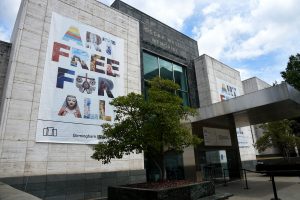 Birmingham Museum of Art (BMA)
Birmingham Museum of Art (BMA)
In 2020, the Birmingham Museum of Art (BMA) closed from March through October. One of the biggest challenges involved layoffs of most of the part-time staff, said Graham Boettcher, PhD, R. Hugh Daniel Director of the BMA.
“Many of them worked in a visitor services capacity. Without visitors, we simply didn’t have the resources to sustain our pre-pandemic staffing levels,” he said. “Like most organizations, when we were closed to the public, we had to find new and different ways to connect with the community we serve.”
Those new and different ways included virtual programs and digital education and exhibition experiences.
“Technology has enabled us to connect with individuals near and far who may not be able to visit us in person, opening our collection and programs to an even wider audience than we ever could have imagined,” Boettcher said.
Prior to reopening in October, the museum put several safety changes in place.
“We now require face masks for all visitors, and we’ve installed hand sanitizer stations throughout the building. We also have closed many of the touch interactives, including our iPad stations and our hands-on family gallery, Bart’s ArtVenture,” said Boettcher.
BMA staff has worked remotely and in person since the onset of the pandemic.
“Many of our employees can complete nearly all of their job duties remotely. Others, [such as security personnel and those who hang and receive art], may not be able to complete any of their duties without being on our physical premises. Limiting the number of employees working on site to only those who need to be here has helped mitigate the spread of the virus,” Boettcher said, adding that he is optimistic that some things can return to pre-pandemic levels.
“When we closed the doors [on March 15, 2020], some experts were anticipating a return to ‘normalcy’ by that July,” he said. “While we’re taking things one day at a time, for planning purposes I remain optimistic that we’ll see a return to normal operations by the end of the summer [of 2021].”
City of Birmingham
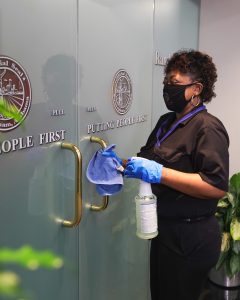
Birmingham Mayor Randall Woodfin wasted no time in responding to the COVID-19 pandemic last March.
“[The mayor] required people to wear masks in the city, including while visiting all city facilities,” said Public Information Officer Chanda Temple. “We have signage up at all city facilities, reminding people to wear masks while in the building, to practice social distancing, and to wash their hands. A staggered schedule for staff has been put in place to help reduce exposure, and employees are encouraged to hold meetings virtually instead of in person.”
In addition to putting up signage in all facilities, the city has taken several other steps to help reduce the spread of COVID-19, including: water fountains at all city facilities and parks have been turned off; basketball courts, indoors and outdoors, remain closed; no more than four people should ride a city elevator (if a person sees four people on an elevator, they are encouraged to wait for the next one or take the stairs, if possible); hand sanitizing stations and/or hand sanitizer is available at all city facilities; and high-touch areas in city facilities are disinfected on a regular basis.
Temple said city officials will continue to closely monitor reports from medical experts.
“We will make adjustments based on the status of the virus, what impact it will have on the public, and what impact it could have on services,” she said. “When or if we get back to pre-pandemic status will be based on the conditions and the recommendations from our health leaders. This is no different from how we have operated throughout the year.”
 Birmingham Zoo
Birmingham Zoo
The Birmingham Zoo scaled back in large and small ways when the pandemic hit. When it closed in March for two months “we restructured internally, trying to figure out how we would reopen,” said Samil Baker, Public Relations and Social Media Manager.
After reopening in June 2020, “we cut our hours back,” Baker said. “We had to scale back on all levels in regard to operations and staffing to do what we could to make sure we provide the best, safest experience for the public.”
Prior to the pandemic, the zoo was open seven days a week, Monday through Sunday. It is now open Wednesday through Sunday, and that schedule will stay I n place until the end of 2021, Baker said.
Visitors are also limited. Prior to COVID-19, there could be 4,000 to 5,000 people in the zoo at a time, but now no more than 500 people are allowed in every 30 minutes, or 1,000 people per hour.
“We have a one-way path, … [so] you no longer can just walk in the zoo and go left or right or to each habitat. … That’s just to help funnel the crowd so people aren’t crossing each other. That has been working well. Parents don’t mind, and guests have been telling us they have been able to see more of the zoo. … With the one-way path, they are getting a longer, better experience from us,” said Baker.
As for staffing, those workers who care for the animals remain on the grounds with a regular schedule, as well as some others, including maintenance, health care, operational, and animal nutrition employees. The administrative staff’s schedules have been altered, too.
“Our marketing and finance departments all work from home, but there are days within the week that they are asked to work [in person at the facility],” said Baker.
Like most entities, the zoo would like to return to normal, she said.
“We’re an outside facility, so people love coming here because they think they don’t have to wear a mask, but they do. We have animals, and a lot of them are susceptible to human viruses,” she explained, adding that “until we’re 100 percent sure masks are no longer required,” some safety measures will remain in effect.
In Part II, which will be published on March 18, Jefferson County, Jefferson County Department of Health, Miles College, the Negro Southern League Museum, Railroad Park, Regions Bank, Vulcan Park and Museum, the University of Alabama at Birmingham, and Jefferson County Courts will discuss the changes they’ve implemented in the year since the onset of the COVID-19 pandemic.
Click here to read more stories relating to one year after COVID-19.




